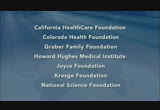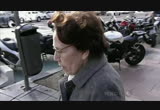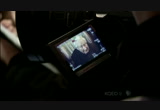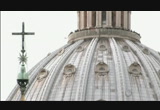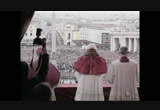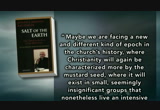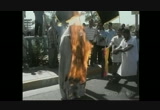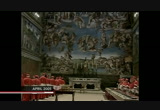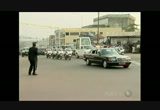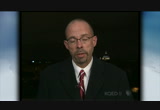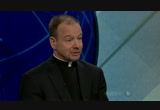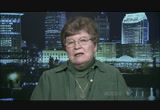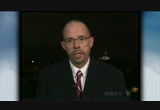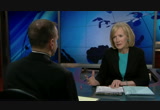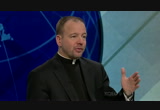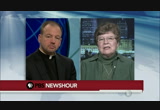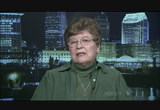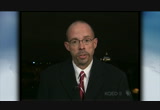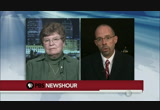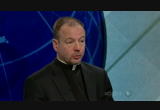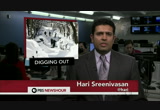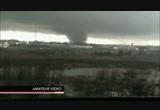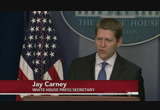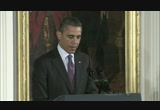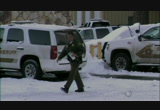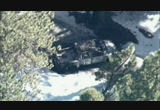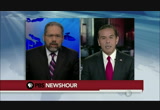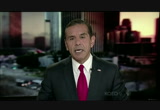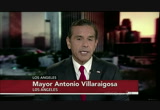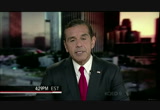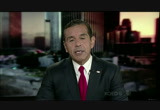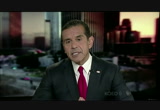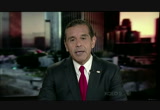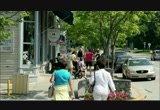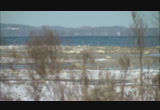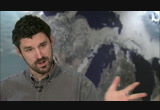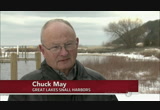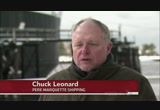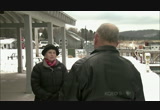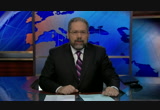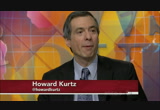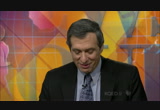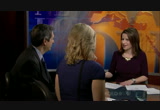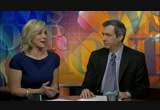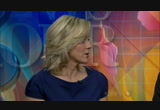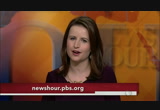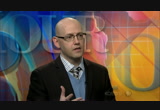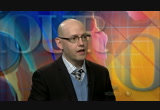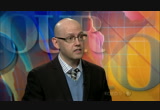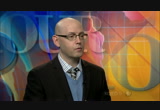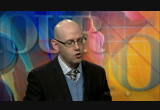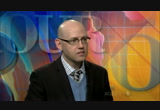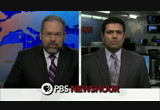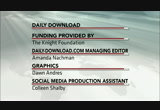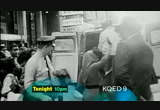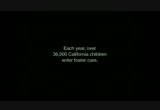tv PBS News Hour PBS February 11, 2013 3:00pm-4:00pm PST
3:00 pm
creepier. >> woodruff: that's all ahead on tonight's newshour. >> major funding for the pbs newshour has been provided by: moving our economy for 160 years. bnsf, the engine that connects us. >> and by the alfred p. sloan foundation. supporting science, technology, and improved economic performance and financial literacy in the 21st century. >> and with the ongoing support of these institutions and foundations. and... >> this program was made possible by the corporation for public broadcasting.
3:01 pm
and by contributions to your pbs station from viewers like you. thank you. >> suarez: the world witnessed something today it had not seen since the 15th century: a sitting pope, benedict xvi, announced he is giving up the papacy. the news reverberated around the globe and stunned many of the world's 1.2 billion catholics. >> it was a big surprise because this doesn't happen all the time. and my first reaction was to pray and to call my friends, texted my friends and asked even my non-catholic and nonbelieving friends to keep us in their thoughts and in their prayers. >> i had never heard anything like this in my life. the pope has to be there until he dies. and he is resigning? >> popes can't resign. this hasn't happened in 600
3:02 pm
years. a pope can't resign. this news isn't right. >> suarez: a pope abdicated in 1294 but the last pontiff to do so was gregory 12th in 1415. pope benedict's decision at age 85 came in an announcement made in latin during a meeting of cardinals at the vatican. >> dear brothers, i have called you not only for the three can onizations but also to communicate to you a decision of great importance for the life of the church. after having repeatedly examined my conscience before god i have come to the certainty that my strengths due to an advanced age are no longer suited to an adequate exercise of the papal ministry. >> suarez: underscoring that point benedict's brother said today the pope's doctors recently advised him not to take any more transatlantic trips. in a 2010 interview, benedict said a pope could step down if he felt unable physically to
3:03 pm
carry on. he had visibly slowed in the last few years. >> the last one who made the pope last week and i said that he was tired an tire. >> suarez: few outside his inner most circle saw it coming. and the announcement instantly sparked speculation about whether there was something more to the decision. >> it's unique in terms of the papacy. so it could be deeper. than what we've been told at the moment. >> i can only accept his resignation if he were ill and could no longer carry out his post but i can't accept any other reason. no whatsoever. >> suarez: a vatican spokesman insisted the pope had no specific medical problem and that he came to this decision on his own without any outside pressure. >> great freedom and clarity.
3:04 pm
we admire his totally freedom in renouncing to his people. >> suarez: benedict's actions stood in particular contrast to that of pope john paul ii, his immediate predecessor, who served 27 years, the second longest of any pope. during that tenure, john paul was shot by a would-be assassin and later contracted parkinson's disease. in his last years he struggled to walk, speak, and even listen until his death in 2005. days later, white smoke arose from the chimney of the sistine chapel to signal cardinal joseph ratzinger election. he was at 78 the oldest pope elected in nearly 300 years. the future benedict xvi was born in germany in 1927, an archbishop of munich and then
3:05 pm
cardinal. for nearly three decades he was one of pope john paul's most trusted aides enforcing conservative doctrine. as pope he warned against growing secularism in the west. it was not always a popular stance in europe and north america as evidenced today. >> the next pope we need somebody who will modernize the church somewhat and move with the times so that they don't lose their audience and all the younger people. >> hopefully the next pope will be eventually a little bit better and more inclusive than this one was. >> suarez: but benedict was undeterred by such views. he suggested as much in his 1996 book salt of the earth in which he wrote maybe we're facing a new and different kind of epoch in the church's history where christianity will be characterized more by the mustard seed where it will exist in small seemingly insignificant groups that nonetheless live in intensive struggle against evil. to that end, the pontiff focused
3:06 pm
on promoting roman catholic growth in latin america and africa. he also made use of twitter and other social media to reach new and younger audiences worldwide. and he sought to reach out across faiths but with decidedly mixed results. in 2011 he formally announced the jewish people should not be condemned for the death of jesus but he angered many jews by lifting the excommunication of a conservative british bishop who denied the holocaust. in 2006 benedict quoted a byzantine emperor speaking on the prophet mohammed. >> show me just what mohammed brought that was new and there you will find things only evil and inhuman such as his command to spread by the sword the faith he preached. >> suarez: outraged muslims burned the pope in effigy. he later visited the blue mosque in istanbul turkey to pray with
3:07 pm
the grand imam in a bid to restore calm. a fire he could not extinguish was the ongoing scandal involving sexual abuse of children by priests in country after country. two years ago, letters emerged showing that as cardinal in charge of handling the growing crisis, benedict resisted removing priests accused of being child molesters. and last fall the pope's former butler was convicted of leaking personal documents, some pointed to alleged mismanagement at vatican lending institutions. now the roman catholic world awaits a successor to chart the direction of the church and address lingering scandals. pope benedict officially steps down february 28. then the college of cardinals will meet in a papal conclave held in the sistine chapel to elect a new pope. by vatican law, all cardinals under 80 at the time of voting are allowed to cast a ballot. 118 now meet that standard.
3:08 pm
>> without doubt, this is an historic moment. right now 1.2 billion catholics the world over are holding their breath. >> suarez: benedict himself will have no official role in choosing his own successor, but 67, more than half the voting-he will vibl cardinals, were appointed by him including the archbishop of washington cardinal donald whirl. >> we will be looking for someone who is a very articulate voice in that continuity. but i think we also will be looking for someone who will carry on the spiritual traditions that pope benedict has so focused on. >> suarez: more than half the current cardinals come from europe but more than half the world's catholics now live in africa and latin america. already there's speculation the next pontiff may be the first non-european ever. >> woodruff: for more on benedict's resignation, his less
3:09 pm
an and the future of the church, we're joined by monsignor rick hilgartner of the u.s. conference of catholic bishops. he's the executive director of the secretariat of divine worship. sister christine schenk, a catholic nun and executive director of future church, which calls for a more progressive church. and from rome, john allen of cnn. he covers the vatican for the network and for the "national catholic reporter." we thank you all three for being with us. john allen, i'm going to stay with you. how much of a surprise was this? >> judy, i think this was a near total shock. just to tell you how crazy it was, i was actually scheduled to have lunch with a senior vatican official, a guy who works just down the hall from the papal apartment. as of early this morning even he didn't know it was coming. as your set-up piece indicated the shock isn't the content of the decision -- benedict had hinted fairly openly that he was receptive to the idea of a pope resigning, that actually under
3:10 pm
some circumstances a pope would have an obligation to resign if he's not able to continue to perform his duties. but certainly the timing of it, i think, fell out of a clear blew sky just like the rain we're experiencing in rome here tonight. >> woodruff: monsignor hilgartner, what about the timing of this? what does it say that he made this decision especially in contrast to what his predecessor pope john paul had been through. >> pope benedict as one of pope john paul's closest advisors would have seen clearly the challenges of pope john paul's suffering. and the way that perhaps the church might have struggled around him because of his own limitations. i think it's been visible to see the pope's weakness has been more and more evident when you see him at mass, at christmas masses this past christmas and some of the other major events, he sounded weaker and weaker. he's moving more and more frailly. i think it's a real sign of
3:11 pm
courage that he recognizes that the job is bigger than he is. as for the timing, this was all his own discernment and his own heart. as john allen just said, no one saw this coming. >> woodruff: sister christine, what about you? how did you read this given how unprecedented it is? >> well, i think it is very unprecedented. i agree with the professor. i think that... i don't know how he could have lived through the waning days of pope john paul ii's papacy and not been aware of how difficult it would be to continue vatican business. so we give pope benedict a lot of credit for the courage of stepping down. the other piece i think that is, i don't know maybe a little rose-colored glasses but somewhat hopeful is that for the first time at least in recent history, a pope has basically
3:12 pm
said the office is more important than the person of the papacy. and so it sort of moving a bit away from the monarch cal model. it's not something that catholics are used to. but i do think it is a step in the right direction and could bode well for the future. >> woodruff: john allen, what about that? this notion that perhaps it's a statement that the office is more important than the person? >> well, i think benedict, to some extent in contrast to john paul ii who was such a swashbuckling charismatic figure, it was sometimes difficult to separate the office from the man. i think benedict has always been a kind of more humbler and lower-key figure. i mean, you can see that in several small touches along the way. his preference, for example, for celebrating his public masses inside st. peter's basilica rather than out in the square,
3:13 pm
so the focus was more on the worship space and the event rather than on him personally. his willingness to renounce some of the traditional symbols and titles of his office and so on. so i think there is something there. though at the end of the day, i also think there's a danger in trying to read too much into the faith value meaning of this. i think this is one case in which for the most part we ought to take the pope at his word. his calculation was with a clear-eyed awareness of the enormity of responsibility of serving as the spiritual leader of this 1.2 billion strong church that given his age and increasing limitations was no longer up to the task. he felt it was time to step aside and let someone else take over. for the most part that was in fact the basis of the decision. >> woodruff: monsignor hilgartner, there will be a lot of discussion about what his legacy will be. as we begin to look at it tonight, what stands out to you? >> i among all the things that the pope gets involved in
3:14 pm
politically because the pope is a world leader because the vatican is a country, his immense embracing of his role as pastor. when we look at his writings since becoming pope, there was a real shift. as a theologian as a teacher this years earlier as joseph ratzinger, he wrote as a theologian but as pope his three major writings were not doctrinal sweeping changes but he was writing about faith, about hope and about charity. these basic things. the real message of his preaching has always been to invite people to a personal relationship with jesus in the most basic way. and from day one of his pontificate that's really struck me that he really preached like a pastor. i remember his first christmas homily as pope, he talked about the analogy of giving gifts and receiving gifts and recognizing the gift that we receive from jesus. it sounded unlike anything we had heard from popes who tend to
3:15 pm
speak very academically and philosophically. >> woodruff: sister christine, how do you see his legacy? what is the mark that he leaves on the catholic church? >> i apologize. i appreciate the monsignor's statements. and i agree. i think this has been a very pastoral theologically astute beautiful beautiful theo logical writing, but my frankly big difficulty here is given our foundations with addressing the worldwide priest shortage, i just remember after 2005 he gave this beautiful invitation on the centrality of the mass to catholic worship. it was clear how much it meant to him and how important it was. but what i have problems with is that a good 80% of the catholics around the world have no access to the mass whatsoever because there aren't enough priests.
3:16 pm
so my take on it is, yes, he's a great theologian but we have not addressed some of the most sweeping concerns in the catholic church today. that has to do with the availability of priests to continue our legacy. from that point of view, his failure to recognize the need to expand order nation beyond the male sell bait priesthood is a very... i think it's leading to a big crisis institutionally. up only have to look at the united states with all the large numbers of parishes closing and clustering. in the next six years according to the center for applied research, we'll have only 13,500 priests to serve our 17,000 parishes. in brazil over 80% of all sunday worship is led by lay people because there aren't enough priests. in fact, those numbers... we're losing catholics in brazil. the latest numbers brazil used
3:17 pm
to be 100% catholic. now it's been 50 and 70%. theo logically is one thing. running the church is another thing. i think we need some help in the latter. >> woodruff: in addition to that, john allen, of course, we can't discuss his legacy without the story of what happened with child sexual abuse, how he and others in the church dealt with that under his leadership. >> that's right. i mean, judy, of course, a legacy is always to some extent in the eye of the beholder. certainly those most wounded by the child sex abuse scandals in the church, the victims, their families, others who have been caught up in this really this plague that has gripped catholicism for the last decade or so, they will not be able to remember benedict xvi without thinking of that. his defenders will tell you that he made enormous strides in the effort to make the catholic church a safe environment for children. remember the first pope to meet with victims of sex abuse which
3:18 pm
he did for the first time in the united states in april 2008 and did six times total over the course of his papacy, the first pope to apologize directly for the crisis to institute zero tolerance as the official policy of the church. critics will say much of that was too little too late. too much was left undone but that of course is not the only issue that people will remember about this pope. many liberals in the catholic church, for example, would praise him on some fronts but suggest overall his leadership rolled back the clock on the reforming spirit of the second vatican council in the mid 1960s. many women particularly religious women in the united states, nuns, will remember the crackdowns on american nuns that unfolded on his watch. while his admirers, i submit, will probably remember him as one of the great teaching popes of modern times perhaps of all time who for almost eight years led a sort of global graduate seminar about the relationship between reason and faith and the place of religion in a secular world. i think the truth, judy, is all
3:19 pm
of of those things have validity. all of them add up to the full picture of a pope who had his strengths and his weaknesses. i think will undoubtedly be remembered for both. >> woodruff: monsignor hilgartner all of that plays into the question of what role will he play in the selection of his successor? he won't have a vote but he selected more than half of the cardinals who will be doing the picking. >> he has selected more than half. there was a question as to whether or not he would participate. and the holy sea clarified this morning in the middle of all the other news that he would not participate. but his influence is clear. i think even his statement this morning about recognizing that there are major things that the church needs to address and do that he doesn't feel that he has the stamina to be able to accomplish really sets the stage for the cardinals when they gather to begin to look at and discuss and reflect on what those issues are. as they then move into the
3:20 pm
conclave to make that decision and prayerfully select the next pope. >> woodruff: we are just beginning to look at the legacy of this pope. pope benedict. we thank you all three for joining us to begin to consider it. monsignor hilgartner, sister christine schenck, we thank you. and john allen of cnn and national catholic reporter, thank you. >> suarez: on our website you can >> suarez: on our web site, you can read the pope's full resignation statement, take a look at modern papal reigns, and see a slide show of moments from benedict's papacy. and still to come on the newshour, the los angeles police department on alert; historically low water levels in the great lakes; to like or not to like on facebook; and novelist brad meltzer on presidential assassins. but first, the other news of the day. here's hari sreenivasan. >> sreenivasan: the northeastern u.s. spent much of this monday still digging out from friday's blizzard, and utility crews kept working to restore power to some 150,000 customers. in some places, the snow was three feet deep and the work of
3:21 pm
snow-blowing and shoveling was still going on, three days after the storm hit. massachusetts governor deval patrick was in scituate today, and said most major highways were clear of snow. . >> over the last day crews have been out on all of the roads really trying to get down to the secondary roads. to make sure that they are passable and safe so the school can resume and people can come and go through their routines. >> sreenivasan: many public schools throughout the region remained closed out of safety concerns. overall, 15 deaths were blamed on the storm. wild weather was also to blame for damage across mississippi on sunday, this time including a tornado. a nearby resident captured the moment that a funnel cloud tore through the main street of hattiesburg, mississippi, damaging scores of buildings and homes. more than 60 people were treated for injuries, but no one was killed. in syria, rebels captured the country's largest dam today, as fighting raged nationwide. the seizure of the al-furat dam
3:22 pm
in northern syria was a coup for the opposition. it gave them control of much of the country's water and electricity supplies. also today, a minibus exploded a syrian border crossing with turkey, leaving at least 13 dead and dozens more injured. democrats in the u.s. senate pushed back today against a threat to hold up two of president obama's cabinet nominees. the chair of the armed services committee, carl levin, announced plans for a tuesday vote on chuck hagel to be defense secretary. on sunday, republican senator lindsay graham warned he might hold up hagel and john brennan, the choice for c.i.a. director. graham demanded more information on the u.s. consulate attack in benghazi, libya. today, white house, spokesman jay carney rejected any delay. >> what is unfortunate here is the continuing attempt to politicize an issue -- in this case through nominees that themselves had nothing to do with bengs ay and to do so so in a way that does harm to our
3:23 pm
national security interest. senator hagel, mr. brennan, they need to be confirmed. they're highly qualified candidates for their posts. >> sreenivasan: any effort to hold up the hagel and brennan nominations would wait until they reach the floor of the senate. former u.s. army staff sergeant clinton romesha received the nation's highest military decoration this afternoon, the medal of honor. on october 3, 2009, in northeastern afghanistan, he and 50 other americans were attacked by 300 taliban fighters at combat outpost keating. he led a desperate day-long battle despite being wounded, and killed at least ten insurgents himself. at the white house today, president obama said romesha risked his life to rescue the wounded and retrieve bodies. >> clint romesha lives the soldier's creed: "i will never leave a fallen comrade." so he and his team started charging as enemy fire poured down, and they kept charging, 50 meters, 80 meters, ultimately 100 meters run through a hail of bullets.
3:24 pm
they reached their fallen friends, and they brought them home. >> sreenivasan: romesha is only the fourth living medal of honor recipient for actions in iraq or afghanistan. on wall street today, trading was light, and stocks drifted lower. the dow jones industrial average lost more than 21 points to close at 13,971. the nasdaq fell a little less than two points to close at 3192. those are some of the day's major stories. now, back to ray. >> suarez: and we turn to the search for the ex-officer wanted in multiple killings in california. authorities have been given hundreds of tips for the suspect, who is still at large. but he was charged today with the murder of a riverside police officer and the attempted murder of other officers. those charges could bring the death penalty. the manhunt was in its fifth day as law enforcement agencies across southern california kept looking for christopher dorner. authorities said they're hoping a $1 million reward will yield new leads on dorner's whereabouts.
3:25 pm
>> our dedication to catching this killer remains steadfast. >> suarez: los angeles mayor tony villaraigosa announced it yesterday. >> we will not tolerate this reign of terror that has robbed us of the peace of mind that residents of southern cal deserve. >> suarez: dorner is wanted for the murder of a retired police captain's daughter and her financee in irvine eight days ago. the 33-year-old fugitive also allegedly killed a riverside police officer in an ambush last thursday. investigators feared dorner plans more killings as revenge against the l.a. police department. it fired him five years ago for falsely accusing his training officer of kicking a suspect. authorities found dorner's burned pick-up truck near the big bear ski resort late last week, but they've since been forced to scale back the search in order to protect 50 police
3:26 pm
families believed to be in danger while still answering regular calls for assistance. police chief charlie becker. >> obviously we're getting tips since the reward offer like crazy. we have three times the amount of tips that we did yesterday. we're following up on everyone of them. so hopefully there's a nugget in there that will lead us to his capture. >> suarez: so far there have only been false sightings of dorner including one at this northridge area low's store yesterday. meanwhile the l.a. police department has reopened its investigation into the case that prompted dorner's firing. >> i spoke to the i spoke to mayor villaraigosa a short time ago to discuss how the city is dealing with the manhunt, as well as some of the questions raised by this case. mayor, welcome back to the newshour. let's start with the state of the search. is there any progress to report? who is helping you and where are you concentrating? >> i can't tell you that there are any... that there's any progress to report. i can't tell you that we're
3:27 pm
following many, many leads, over a thousand leads now. we're looking for him. we've got our best detectives and investigators on this. we're working with the city of irvine and the city of... and county of riverside, the county of san bernadino, the marshals service, the f.b.i., we're all working and collaborating to find christopher dorn eras soon as possible. >> suarez: you mentioned the large number of leads. have some of those come in response to your recently offered million dollar reward? >> yes. some have come in response to that. but we're following every single lead. we take this matter very, very seriously. remember there are three people dead, killed in cold blood by christopher dorner, a man who is obviously armed and dangerous,
3:28 pm
who has targeted some 50 individuals and families, who clearly is bent on some kind of revenge. we're doing everything we can to find him, to arrest him and to bring him to justice. >> suarez: you mentioned the target list. you've also got a large number of l.a.p.d. assets involved in the search itself. add to that an event like the grammy awards with a large number of v.i.p.s in town. has your police department been spread a little thin the last couple of days? >> well, they're certainly feeling the strain of having to deploy as many resources as they have and particularly during this time but i'll tell you, i couldn't be prouder of the men and women of the los angeles police department and of the law enforcement agencies that have been working on this. they take this personal when people's families are being
3:29 pm
subjected to threats of this nature. they're working as hard as they can to bring christopher dorner to justice. >> suarez: are there any credible sightings since thursday when the burned-out pick-up truck was found or any reasonable tips that give you an idea of his movement? >> no, there are no credible sightings that i know of. i've been briefed almost hourly and certainly whenever there's a new development. i can tell you that we're following every lead. we don't know his whereabouts but we have extended the area that we're looking for him in. we're doing everything we can. we recognize what a threat he is to the public and to the people on that list. >> suarez: in recent days your police chief, charlie beck, has announced he wants to reopen, reexamine the files of the case that led to the firing of
3:30 pm
christopher dorner. why does your chief feel that was necessary? what might be in there? >> well, look, the chief committed to constitutional policing, committed to making sure that our department is transparent as possible in everything we do. in order to address any concerns that some in the public may have with respect to what happened in the case of mr. dorner. he's reopened this investigation but i'll say this. there is absolutely nothing, ray -- nothing -- that could have happened to him to justify killing three people in cold blood. three innocent people. remember, he ambushed officer crane and his partner. he shot at and tried to kill two l.a.p.d. officers. he killed captain kwan's daughter and her financee in cold blood. this is a man who is hell bent
3:31 pm
on mayhem and destruction, who is willing to kill, and nothing that could have happened to him justifies those kinds of atrocious acts frankly. >> suarez: this is not in anyway to justify or explain what christopher dorner has done. but when the city is in a crisis like this, when there is a case of this kind, is there a history that has to be reckoned with between the l.a.p.d. and the people of the city of los angeles, between the officers of color and the people of color and the l.a.p.d.? >> well, look, as you probably know, we were under a consent decree for a long time. i have worked hard with the chief and with chief bratton before him to get us out of that consent decree. we arcon we are absolutely commd to policing.
3:32 pm
than any time in our history. we are now the most diverse that we've ever been about almost 75% of our police officers come from communities of color. latino, african-american and asian. about 20% are women. we are absolutely committed to working and collaborating with every community, respecting the rights of the people in our community. as i said, this is a separate matter. the chief decided that we were going to be as transparent as possible with respect to what happened to mr. dorner. but as i said, there is nothing, absolutely nothing, that justifies killing people in cold blood in the way that he has. there are many who would say that the department was right in firing him, given what he has done now in this situation. >> suarez: the mayor of los angeles, thanks for joining us.
3:33 pm
>> thank you for having me. >> suarez: online we link to resources from southern california public radio, including a timeline of events from christopher dorner's life. >> woodruff: now, why some of the great lakes are dropping to record low levels, and the economic bite that's accompanying this environmental change. elizabeth brackett of wttw- chicago has the story. . reporter: leyland's harbor is the heart of this northern michigan town. the small town is quiet in the winter. but the population jumps ten fold in the summer when tourists flock to leyland's harbor, beaches and quaint shops. that tourist economy is is now in jeopardy because of the dramatic drop in lake michigan's water level. harbor master russell zuba says the lake is down more than two feet from its average. and that drop is threatening to
3:34 pm
close the harbor. >> the economic impact this harbor has on the community is strong. when things are slow, the guy at the grocery store, the guy at the restaurant comes down and asks me what's going on. >> reporter: the guy asking the questions from the grocery store is likely to be joe burda. his family runs the only grocery store in town. >> summer business in general keeps us open for the rest of the year. the boats and the traffic that the harbor brings in is pretty big percentage of what we do in the summer. >> reporter: the low water also endangers leeland's historic fishing industry, a huge tourist draw. now these fishing boats, which were bought and are now run by the local preservation society, sit perilously close to the bottom of the lake. across the peninsula from leyland on grand travers bay rocks and boulders, long underwater, got the now dry... dot the now dry lake bed. docks sit far from the water.
3:35 pm
in nearby sutton's bay sand flats appear. concrete blocks that once anchored boats now sit in just inches of water. if i had been walking down this beach in sutton bay in 1984, the water would have been almost a foot over my head. the army corps of engineers confirmed that lake michigan and lake huron water levels have hit an all-time low. on this chart, the blue line shows the long-term average for the two lakes. the red line, the actual monthly water levels. scientists at the great lakes environmental research laboratory in ann arbor michigan blame evaporation and less precipitation for the dropping lake levels. >> when the water temperatures increase, which they are right now, especially in through the summertime, then in the fall when we have the cool air masses coming over the lakes we have increased evaporation. that evaporation rate has been exaggerated particularly this year. we're in a year with extremely
3:36 pm
low precipitation. very little rain was coming into the system both in the form of snow and direct rainfall on to the lakes themselves. >> reporter: last winter was the fourth warmest winter on record. and those warmer temperatures lead to less ice formation and still more evaporation. >> when the lakes are changing that dramatically that is a change in the climate. now what is causing the lakes to warm so much, that is something that is going to require some additional research. >> reporter: with great lakes water levels at historic lows, the only way to keep harbors open is by excavating or dredging the lake bottom. but chuck may, who chairs the great lakes small harbors coalition, says the money for dredging has dried up. >> you've got almost a perfect storm hitting the great lakes harbors. you've got low water. and you've got lack of maintenance. lack of dredging. lack of infrastructure. and you combine those two and you've got situations where we
3:37 pm
truly face a crisis throughout the great lakes. harbor after harbor. it's just growing. >> it's not just tourist towns that are suffering. so are commercial harbors like this one in ludding ton 100 miles south. it is one of the 139 commercial and recreational harbors around the great lakes. undernew federal regulations issued by the obama administration, only commercial harbors that handle one million tons are eligible for dredging. today only 15 of the great lakes harbors meet that criteria. that worries chuck leonard, the chief operating officer for a car ferries and barges.operates he is concerned about what low water levels will mean to the amount of tonnage he can ship. >> we're starting to see with our vessel where we're having to light load. i'm afraid we could see that increase moving forward. >> for every inch the water level drops, carriers for fit
3:38 pm
8,000 tons of cargo. as loads shrink, the one million ton rule becomes harder to meet. >> we can't get the vessels loaded to where we'd like to to get them in the harbors, the tonnage in the harbors diminishes. then they become unfndable because the tonnage isn't adequate for the funding. being in the shipping industry right now is a very frustrating experience. >> leonard's company pays into a harbor maintenance tax. he and chuck may think that money should be used for dredging. >> the federal government actually owns these harbors, these handles. and they actually have a tax called the harbor maintenance tax that they put in place beginning in 1985 to take care of these harbors. so far in the past 15 years, they have collected $8 billion that they have not spent on harbors. >> reporter: legislation introduced to force all the tax money to be spent on maintaining the harbors has not gained
3:39 pm
traction in congress. leyland harbor master zuba, frustrated at seeing on theres play on a beach that shouldn't exist, has looked elsewhere for money. >> in '07 the appropriations stopped so we started fund raising at a local level. that's where we are today. >> reporter: he raised $120,000 last year to pay for dredging to keep the harbor open. but he says he doesn't know how long the community can support those costs. and scientists predict that lake levels will drop further this winter with ever greater consequences for the 30 million people who live in the great lakes basin. >> suarez: next, another of our conversations about the digital world's cultural impact. newshour political editor christina bellantoni is here with our daily download team.
3:40 pm
>> chances are these days when you log into facebook, you'll be asked to like just about anything from a brave police dog to a mom fighting bullying. is this trend just another on-line popularity contest or does it mark a societal shift? we explore the question with two journalists from the website daily download. lauren ashburn is the site's editor in chief. howard kurtz is host of cnn's reliable sources. lauren, howy, thank you for being here. >> thank you. is is a question we want to explore. let's start at the beginning. what does it mean when you log into facebook and are asked to like something? >> well, it basically means you give it a thumbs up. you endorse the product or the picture that someone has posted or you just simply like what the other person is saying. >> it's kind of facebook's democracy in action. now certain people are tapping into it. you have a picture, i think, of a bunch of kids who wanted a puppy. what do they do? their dad said if they could just get to one million likes, which is phenomenal by the way, he would buy them a dog. >> what i love about this is this is what sold them for them.
3:41 pm
it said here he doesn't think we can do it. i bet everybody says, oh, yeah, dad, you're buying a puppy. >> this isn't just any dad. it's a dad who happens to be a digital media professor at northeastern university. he studied the 19th century. in the age of facebook you can get hundreds of thousands of likes in just a matter of hours. >> what i'd like to know is how did this expand from being your own social network. i saw this photo but i didn't know these people to the world and going viral? how does that happen so quickly? >> i think you post something on your site. then someone reposts it on to theirs. it becomes part of this larger network which is how those children were able to get in seven hours a million likes. >> other kids, of course, ask for a cat or a turtle. i always wanted a cat, got the cat because they got 131,000 likes. i think it's the digital equivalent of when you're around the water cooler in the office, did you see this? when people see something like
3:42 pm
that, it's cute. even though we don't know these kids, everybody got to know them. >> if i get to a million likes, my wife agreed to name my son megatron. but he only got a thousand likes. >> some of these are people having fun. there have been hoaxes. the kids who want the puppy they took it seriously. >> reporter: we're seeing it in other things. you have some examples in the media, in politics. where else are you seeing this? >> vitamin water was one of the first companies that actually decided to try to do this. >> started a competition to help create a new drink flavor but you had to like vitamin water in order to participate. then one fan, she won $5,000 for helping to design or name the black cherry with lime flavor. so companies reaching out. we've seen it in politics. we talked about that a lot during the campaign. it has spread to little children as well. >> reporter: what about a dislike button? facebook doesn't allow that, right? >> no. it's called an opt-out from the privacy setting. there's a very serious issue here about privacy.
3:43 pm
when you get on to facebook, they have you say, click, i agree to terms of service. when facebook is concerned you really need to read those terms of service because your likes can even be turned into ads. >> without your knowledge. i think there should be a dislike button. people should be able to vote up or down. >> reporter: on everything. this is obviously creating some complications within families. oh, you didn't like my picture yesterday. what happens? so we're finding actually that some people seem to be a little overloaded on facebook, right? you have some data... >> they're taking a vacation from facebook. 61% in the new pew study, you can see here, are taking a blake from facebook. >> several weeks or more vacation virtually. there's another 20% who were on facebook, not anymore. the question is, lauren, why are they bailing out? >> why are they bailing out? i mean, i think we can just have a discussion around this table about why we want to bail out of social media. i posted this on my facebook page. you have it on yours as well. the reason in addition to the ones that the study has are the
3:44 pm
fact that you don't like what people are saying politically. we saw that a lot during the campaign season. that it is affecting your family life. that you are obsessed. you are spending too much time on social media and facebook while your three-year-old child is drawing on your carpet. >> i think some people are bored with it. it's got a billion users worldwide. i don't think it has quite the buzz factor. some people may say, well, i can go on my mobile gadget and do other things, play other games, go on other social networks. facebook has competition now. >> reporter: a lot of people say, too, christina, that twitter has usurped facebook in terms of getting information. facebook is much more family oriented. your network is really your network of friends. but twitter is where, if you're a journalist, or... >> public person or a politician. >> ... you can disseminate information. >> reporter: in short little bursts there. of course you have the social media app insta gram where
3:45 pm
people can share the photos and eliminate the facebook middleman. is the data showing any difference with age range here? >> yes. i think so. the older folks are deciding that they've tried it. they don't like it. 20% of them have said i'm not going back. my mother is included in that. i mean, she didn't like the privacy limitations. >> younger people grew up with facebook, they're in college, i think to them whether they're addicted to it or not, it is like the electric utility. they need to be wired into that. >> reporter: we'll be keeping an eye on that. thank you very much, howy, lauren, appreciate your time. now it's your turn to weigh in. have you taken a break from facebook? what drove you to give it up? you can share your story using our open thread for discussion. find that at newshour dot pbs dot org. >> woodruff: finally tonight, a
3:46 pm
best-selling novelist tackles the subject of protecting the president in the modern age. the threats against a president have long captured the darker side of writers' imaginations. in his new thriller, "the fifth assassin," brad meltzer explores those questions too as his protagonist tries to stop a fictional killer. but in this case, meltzer benefited from the helpful advice of a former president and the perspective of the secret service. jeffrey brown sat down with meltzer recently for our book conversation. brad melter, welcome. >> thank you very much. brown: so some of this comes from a program i was reading, it comes from a program you were working with the department of homeland security. >> a few years ago i got a call from the department of homeland security, asked me to come in and brainstorm different ways that terrorists could attack the united states. >> brown: they were reaching out to writers? >> i think... my first thought was if they're calling me, we have bigger problems than we thought. i was honored to be part of what
3:47 pm
they call the red cell program. we bring together what they say are out of the box thinkers who look at things differently. they see my novels and research and said why don't you come in. they would pair me with a secret service agent and a chemist. we would destroy a major city in an hour. you go home terrified because you see how easy it is. >> brown: to think as creatively and destruct tifl. >> out of the box. they want to figure out because if you look at someone who flies planes into buildings and uses them as weapons it's someone who is not thinking in a straight line way. they want to figure, okay, if we get someone else who thinks in a different way, how would you do it. >> brown: that gets your mind thinking about these terrible things, right? i like in this book, the hero works as a researcher in the national archives. >> yeah. brown: he made a hero out of a government researcher. >> you know what i'm no nerdy i didn't realize that was a nerdy job. i thought the guy who works with the declaration of independence and constitution and the pink dress that jackie kennedy wore when her husband was shot that
3:48 pm
sounds like the greatest job in the world. i've spent four year at national archives going through the great attic of america's memories. >> brown: and the research you're doing, we're not going to go through and give away the whole plot here but you're looking at an assassination attempt. >> that's right. brown: were you going back through time and looking... >> what happened is basically over two dozen attempts on the life of the president of the united states. four have been successful. what the plot is is a serial killer who is meticulously recreating the crimes of all the presidential a sass ins from john wilkes booth to lee harvey ons wall. the fun to me is the research looking at what do they have in common in real life. >> brown: the traits and the way they went about it. >> exactly. if you look the secret service studied and said if you look at all the people who have attempted to kill the president nothing in common. every age range and socioeconomic range but look at the four who have successful done it and the overlaps start getting creepier. you'll see three out of the four are in their 20s. they basically are all meticulously neat of all things. they don't drink.
3:49 pm
they barely drink. they don't do any drugs. most of them are known, they're not even known as troublemakers until of course that moment when they pull the trigger. when you really think of assassins they go two categories. hunters and howlers. howlers make a lot of noise. they call in the bomb threats and say they're going to kill us. the goo news is they rarely take action. hunters plot and they execute. they plan and they go through with their plan. >> brown: that would be someone like... >> like john wilks booth or he harvey oswald. hunters have no interest in howlers and howlers have no interest in hunting. when you look at them from booth to oswald all four are hunters. >> brown: i understand that you had one very interesting source, and that's former president george h.w. bush. >> yeah. you know, i've gotten when you write thrillers like i write sometimes you get really good readers. former president clinton has written me letters. former president bush has written me bush and george h.w.
3:50 pm
bush has become a real close friend over the years and has had me come out to houston. we like to talk books and adventure. he have likes to be entertained. i write fiction i can make up whatever i want. we all know that there are only a few people on this planet who know what it's like to live in the white house and know that someone is out there trying to kill you. he was kind enough to put up with my questions saying are you scared of that moment? when this or that happens are you scared? i used those answers to make my characters have real personality as opposed to a fake personality. >> brown: what did he tell you in a nutshell. >> it was interesting. you know, he was almost confused by the question. he was like i can't think of scared. i said what about this or this? and he said, "you know, hence we had a lot of, right? in the white house we got a lot of hintsz. it was lpt like he was he couldn't fathom it. i realized in that moment that these a sass ins have a lot in common but so do our presidents. i think it's almost imagine that guy who works on a sky scraper on the 100th floor, that
3:51 pm
person every day when you're up there, the fear of heights is no longer a part of the job description. for our presidents, when you're surrounded by it everyday and all those secret service and everyone out there, that fear is not part of the job description. it's not false bravado. he's 88 years old. but i just think it's not part of the job description. >> brown: very interesting. let me ask you last briefly, this novel involves a potential wide-scale conspiracy, right, through time as well. >> sure. brown: you have a history channel some show, where you look at conspiracies. are you a conspiracy theory guy? i mean, where does this come from? >> the real question is, am i serious nut? >> brown: i didn't want to put it right like that. >> i think those people are nuts too. for me, i think that anyone who says that there's always a conspiracy is not only being reckless but of course being dishonest. i mean everything can't be blamed on the government. i think the reason people like to code it and watch it is because sometimes we say yes that's wrong. that shouldn't have happened.
3:52 pm
sometimes we say no that's nonsense you read on the internet. i i think people know that the scariest story of all is the true story. >> brown: all right. well this non-true story, right? >> non-true. brown: the fifth assassin. brad meltser, nice to talk to you. >> pleasure. >> suarez: again, the major developments of the day. pope benedict xvi announced he will step down at the end of february, becoming the first pontiff to resign in 600 years. authorities in los angeles charged a fugitive former policeman with murder and attempted murder, as a major manhunt continued. and the north eastern united states spent much of this monday still digging out from friday's blizzard. online, we have more on the medal of honor recipient. hari sreenivasan has the details. >> sreenivasan: read about the extraordinary act of bravery made by former army staff sergeant romesha, and watch the full ceremony in a blog on the rundown.
3:53 pm
the supreme court will hear arguments later this month on a challenge to the voting rights act. do you remember its passage in 1965? share your memories by calling 703-594-6pbs, or visit our politics page to learn more. and what is your state of the union? as the president prepares to give his annual remarks, we've collected your voices on what you'd like to see happen in the year to come. you can read others' reflections and submit your own. all that and more is on our web site, newshour.pbs.org. ray? >> suarez: and that's the newshour for tonight. on tuesday, we'll have full coverage and analysis of the president's state of the union address. i'm ray suarez. >> woodruff: and i'm judy woodruff. we'll see you online, and again here tomorrow evening. thank you, and good night. >> major funding for the pbs newshour has been provided by:
3:54 pm
>> bnsf railway. >> macarthur foundation. >> and with the ongoing support of these institutions and foundations. and... >> this program was made possible by the corporation for public broadcasting. and by contributions to your pbs station from viewers like you. thank you. captioning sponsored by macneil/lehrer productions captioned by media access group at wgbh access.wgbh.org
3:57 pm
3:58 pm
you readjust your retirement plan along the way. rethink how you are invested and refocus as your career moves forward. wherever you are today, a fidelity ira has a wide range of investment choices. call today or make it easy to move that 401k to a fidelity ira. >> a relationship managers work hard to know your assistance. offering specialized solutions and capital to meet your growth objectives. we offer expertise entail solutions for small businesses and major corporations. what can we do for you? >> now, "bbc world news america ." >> this is "bbc world news
3:59 pm
america." it has not happened since the middle ages, 85 years old and frail, pope benedict announces that he will resign at the end of this month. >> you are joking. the pope? oh, my god. >> who will lead the catholic church next and what continent will he come from? we wait for the white smoke to rebuild the succession. with the economy at the forefront, what should we be listening for? we asked one of the top leaders. welcome to our viewers on public television in america and around the globe. joseph is 85 years old and his
226 Views
IN COLLECTIONS
KQED (PBS) Television Archive
Television Archive  Television Archive News Search Service
Television Archive News Search Service 
Uploaded by TV Archive on

 Live Music Archive
Live Music Archive Librivox Free Audio
Librivox Free Audio Metropolitan Museum
Metropolitan Museum Cleveland Museum of Art
Cleveland Museum of Art Internet Arcade
Internet Arcade Console Living Room
Console Living Room Books to Borrow
Books to Borrow Open Library
Open Library TV News
TV News Understanding 9/11
Understanding 9/11
